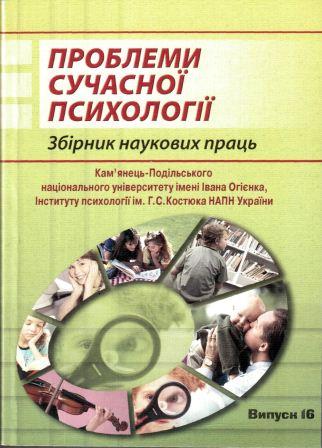Особистісна зрілість як чинник формування психологічної культури майбутнього фахівця
DOI:
https://doi.org/10.32626/2227-6246.2012-16.%25pКлючові слова:
психологічна культура фахівця, особистісна зрілість, самоставлення, мотивація досягнення, Я#концепція, емпатія, почуття громадянського обов’язку.Анотація
Стаття присвячена актуальній проблемі практичної психології –
формуванню психологічної культури майбутнього фахівця – педагога.
Відстежується позитивний зв’язок між рівнем сформованості психо#
логічної культури студентів та їх особистісною зрілістю (зокрема, з
такими її компонентами: рівень домагань, самоставлення, Я#концепція,
емпатія, почуття громадянського обов’язку, патріотизм). Обґрун#
товується можливість підвищення психологічної культури студентів
через розвиток особистісної зрілості активними соціально#психо#
логічними методами навчання.
Посилання
Бодалев А.А. Личность и общение /А.А.Бодалев. – М., 1983.
с.
Гильбух Ю.З. (ред.) Тест#опросник личностной зрелости. – К.:
Научно#практический центр “Психодиагностика и диф#
ференцированное обучение”, 1994. – 23 с.
Долинська Л.В. Тренінг особистісно#професійної зрілості /
Л.В.Долинська, О.В.Темрук – К.: Марич, 2010. – 128 с. –
(Психологічний інструментарій). Бібліогр.: с.120.
Чепелєва Н.В. Психологічна культура майбутнього вчителя /
Н.В.Чепелєва. – К., 1989. – 32 с.
##submission.downloads##
Як цитувати
Номер
Розділ
Ліцензія
Редакція має повне право публікувати у Збірнику оригінальні наукові статті як результати теоретичних і експериментальних досліджень, які не знаходяться на розгляді для опублікування в інших виданнях. Автор передає редколегії Збірника права на розповсюдження електронної версії статті, а також електронної версії англомовного перекладу статті (для статей українською та російською мовою) через будь-які електронні засоби (розміщення на офіційному web-сайті Збірника, в електронних базах даних, репозитаріях та ін).
Автор публікації зберігає за собою право без узгодження з редколегією та засновниками використовувати матеріали статті: а) частково чи повністю в освітніх цілях; б) для написання власних дисертацій; в) для підготовки абстрактів, доповідей конференцій та презентацій.
Автор публікації має право розміщувати електронні копії статті (у тому числі кінцеву електронну версію, завантажену з офіційного web-сайту Збірника) на:
- персональних web-ресурсах усіх Авторів (web-сайти, web-сторінки, блоги тощо);
- web-ресурсах установ, де працюють Автори (включно з електронними інституційними репозитаріями);
- некомерційних web-ресурсах відкритого доступу (наприклад, arXiv.org).
Але в усіх випадках обов’язковою є наявність бібліографічного посилання на статтю або гіперпосилання на її електронну копію, що містяться на офіційному сайті Збірника.






